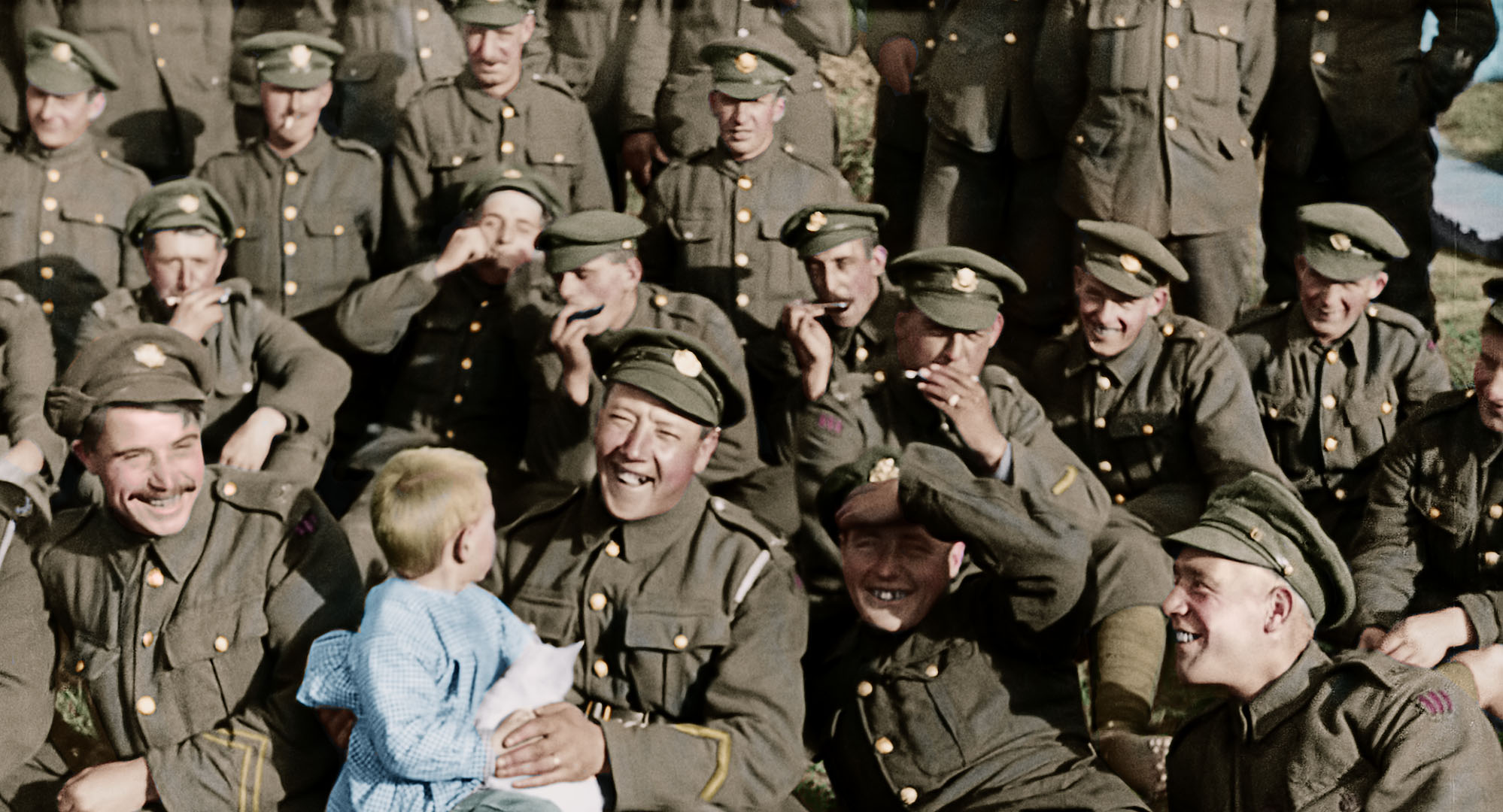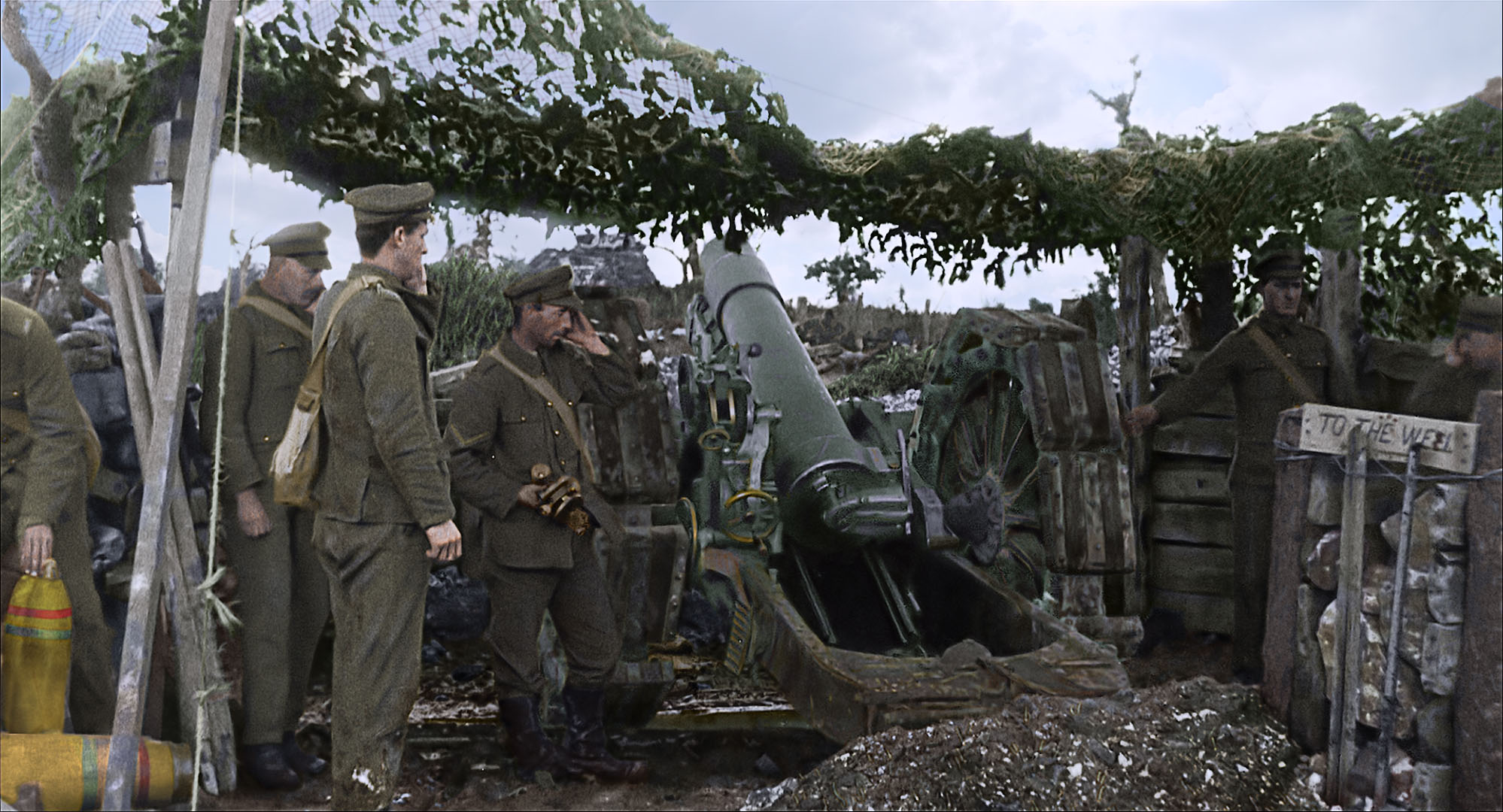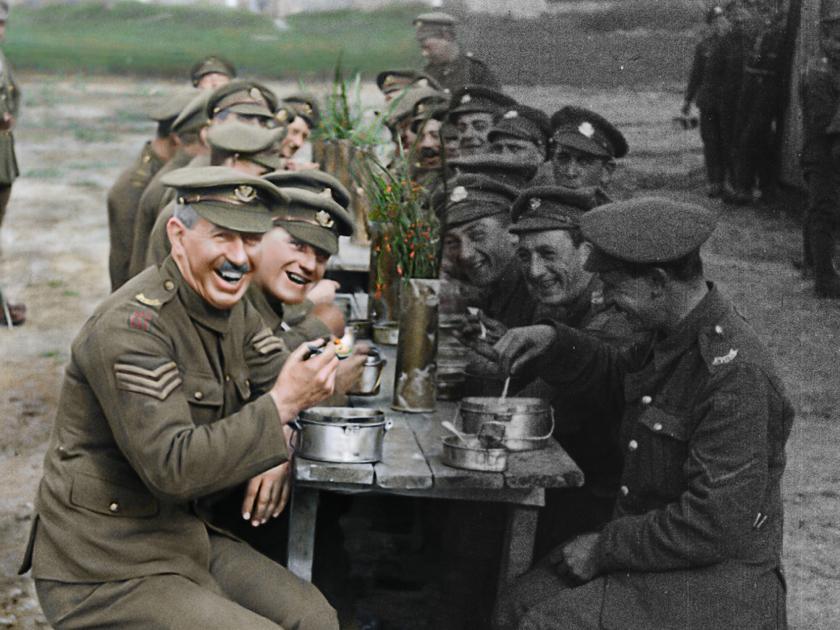Peter Jackson has form when it comes to re-examining cinema history. In 1995 he made Forgotten Silver, a documentary about Colin McKenzie, a New Zealand filmmaker who not only made the first sound recordings but also invented the tracking shot and the close-up, and pioneered colour film, back in the 1910s long before his counterparts in America and France. His impressive oeuvre was lost until Jackson found the abandoned cans of film in a garden shed. In the Jackson documentary, actor Sam Neill paid tribute to McKenzie, Harvey Weinstein gushed, and film historians like Leonard Maltin pontificated. The McKenzie extracts ranged from slapstick comedy to grand guignol drama and were certainly impressive. Only none of them was authentic: Jackson had created all of the monochrome, scratchy sequences himself.
Four years in the making, this feature-length documentary is an ingenious creation indeed. It has been widely acclaimed for making life in the trenches of the Western Front startlingly vivid, and served as a finale to the BBC’s Armistice Day programming. Jackson and his team picked through over 100 hours of original World War One footage from the Imperial War Museum’s archive. Removing scratches, restoring each torn frame, creating a uniform grain and retiming the footage from the original 13 frames per second to the standard 24fps has rejuvenated the faded images. But it wasn’t quite enough for Jackson, who also added colour to the monochrome images through the painstaking rotoscope process and employed lip readers to decipher what the boys in the trenches were saying as the cameras rolled. It’s those snatches of dubbed speech ("Hello, Mum!") and the Foley barrage of sound effects that enhance the illusion of three-dimensionality in They Shall Not Grow Old and give the film its extraordinary vividness. But it doesn’t always make it wholly convincing. There’s so much technical artistry deployed to enhance the old footage that it sometimes becomes a distraction from the history being told.  Jackson decided to concentrate on the British soldiers’ accounts of their everyday existence and battlefield encounters in France and Belgium. Nearly all (if not all) footage shot on the Western Front would have been filmed under official sanction and predominantly used for propaganda purposes, which accounts for so many jolly scenes of larking about in the trenches and displays of armoured tanks and powerful guns.There is little to no footage of genuine combat in existence; in order to animate the descriptions of devastating trench warfare, Jackson edits together contemporary illustrations from patriotic magazines and newspapers. These static line drawings inevitably are not as immersive as the moving shots of dentally-challenged Tommies mugging for the cameras and going about their daily lives between battles. The most enjoyable sequences are about domestic arrangements involving toileting and cooking; the most devastating the colorised shots of wounded men and corpses rotting in the mud.
Jackson decided to concentrate on the British soldiers’ accounts of their everyday existence and battlefield encounters in France and Belgium. Nearly all (if not all) footage shot on the Western Front would have been filmed under official sanction and predominantly used for propaganda purposes, which accounts for so many jolly scenes of larking about in the trenches and displays of armoured tanks and powerful guns.There is little to no footage of genuine combat in existence; in order to animate the descriptions of devastating trench warfare, Jackson edits together contemporary illustrations from patriotic magazines and newspapers. These static line drawings inevitably are not as immersive as the moving shots of dentally-challenged Tommies mugging for the cameras and going about their daily lives between battles. The most enjoyable sequences are about domestic arrangements involving toileting and cooking; the most devastating the colorised shots of wounded men and corpses rotting in the mud.
The desire to make They Shall Not Grow Old as vivid as possible also meant that there is no dry commentary from an expert historian nor captions identifying dates or places or the voices heard. For his soundtrack, Jackson used the audio recordings with World War One survivors made in 1963 for the BBC series The Great War. Although it’s an amazingly rich tapestry (there are some 120 voices heard), it’s important to remember that these interviews were conducted almost 50 years after the war began; the veterans’ memories were surely influenced by the intervening decades. Coloured by nostalgia, their experiences recalled in hindsight and with the knowledge of the war’s aftermath, these soldiers’ stories are vivid but they are not contemporary with the footage.  Smothering the documentary with captions and commentary may well have put off a young audience but at times it felt as if Jackson was catering a little too much to a generation used to playing immersive, open world war games. There is also the impression that in the cutting room the filmmakers’ feared that unless every moment was filled with voices and sound effects, the audience might wander off to check another screen. The narrative pace is relentless; there were times when it would have been good to let one soldier’s account of the horrors sink in before another voice moved on to the next story. Jackson’s technical genius and passion for the historic material is undeniable, but a little less of his desire to dazzle the audience with his artistry and give them room to reflect while watching these extraordinary images would have been welcome.
Smothering the documentary with captions and commentary may well have put off a young audience but at times it felt as if Jackson was catering a little too much to a generation used to playing immersive, open world war games. There is also the impression that in the cutting room the filmmakers’ feared that unless every moment was filled with voices and sound effects, the audience might wander off to check another screen. The narrative pace is relentless; there were times when it would have been good to let one soldier’s account of the horrors sink in before another voice moved on to the next story. Jackson’s technical genius and passion for the historic material is undeniable, but a little less of his desire to dazzle the audience with his artistry and give them room to reflect while watching these extraordinary images would have been welcome.















Add comment